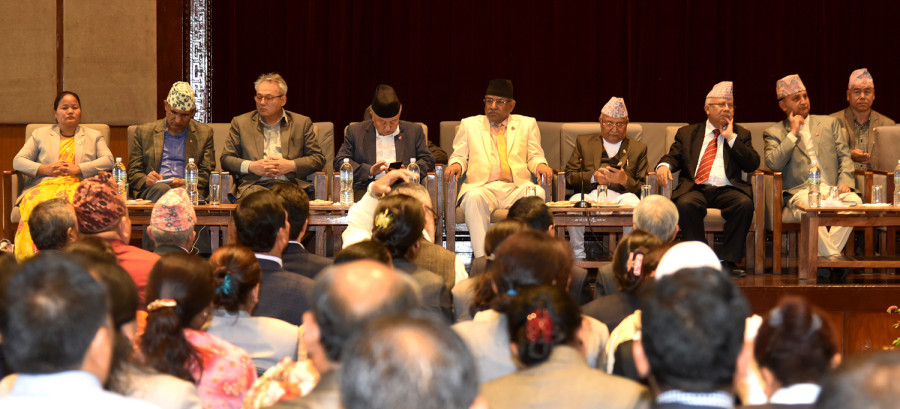Politics
Former Maoist leaders in ruling party fear their apprehensions about merger are coming true
The Maoists are already a minority in Nepal Communist Party as they had merged with 40 percent share in committees.
Tika R Pradhan
Two years ago, when the CPN-UML and CPN (Maoist Centre) leaderships were working to announce the merger of the two parties, there were concerns and apprehensions among the rank and file of the two parties.
Second and third rung leaders expressed their concerns privately, but in public, they toed their leaderships’ line. Leaders from both parties knew that the merger was a compulsion—more for the Maoist party than the UML. Maoist leaders, hence, were more apprehensive. The parties merged in May 2018 to become the Nepal Communist Party (NCP).
Now, as the party is attempting to conclude the unification process, leaders representing the Maoist party are increasingly insecure, as they see former UML leaders dominating—from the government to the party committees.
A Standing Committee member from the former Maoist party said that Maoist leaders feel abandoned by their uncontested leader Pushpa Kamal Dahal, also the executive co-chair of the Nepal Communist Party.
“Our own leader Pushpa Kamal Dahal has stopped paying attention to our concerns,” said the Standing Committee member, who spoke on condition of anonymity fearing retribution. “Some of us are in such a situation that we have to look up to some influential second-rung UML leaders to save our positions.”
Just ahead of the merger announcement, the Maoists were facing questions about whether a party that fought a bloody insurgency for 10 years was going to surrender to a traditional party like the UML. There were also concerns among Maoist leaders about whether the UML was “acquiring” their party, rather than the merger being the respectful unity of two equal entities.
Party leaders now say their apprehensions were right all along.
Chakrapani Khanal, a Standing Committee member and former minister, said that the ongoing discussion on the House Speaker is an example of the UML’s continuing dominion over the party.
“The Speaker’s post was with us before [Krishna Bahadur] Mahara resigned, so it should remain with us. It does not even require so much debate,” Khanal, who was deputy commander of the Maoist army during the insurgency, told the Post. “We are not questioning the leadership’s intention. But what is very clear is that the Maoists are left with no option than to accept what they are being given.”
The Maoists find UML’s claim to Speaker’s post unwarranted. They are also concerned that if this post also goes to the UML, they will have no one to represent them in the Constitutional Council, a key agency that makes key recommendations for ambassadorial and other constitutional positions.
Leaders who quit the Maoist party over the merger with the UML say that they had long foreseen the current position of the Maoists in the Nepal Communist Party.
“The former Maoist leaders, who once could not stand the UML, are now competing with each other to excel in the parliamentary system—a system they fought against,” said Jagrit Rayamajhi, who quit the Maoist party over the merger. “In Nepal, we are seeing a unique counter-revolution led by former revolutionary leader Prachanda.”
But not all Maoist leaders in the Nepal Communist Party are so pessimistic. They say that everything will fall into place once the unification process is completed and the unity convention, planned for two years after the merger announcement, is held.
According to Khanal, it’s the duty of leaders to warn the leadership and keep them in the check.
“If leaders do not feel respected, the party won’t remain united while we are heading for the national convention,” said Khanal.
Khanal also has gripes about the unequal treatment of leaders from the two former parties.
“Leaders from both parties should be treated respectfully,” said Khanal.
The Maoists are already a minority in the Nepal Communist Party as they had agreed to merge with a 40 percent share in party committees.
Lekhnath Neupane, a Central Committee member, who is a vocal critic of the party, said the struggle between the two former party leaders will continue.
“It is becoming clearer that the party would adopt the former UML’s ideology,” said Neupane. “A handful of Maoist leaders may raise their voice, but as long as they get to share the spoils, will they really care?”




 14.24°C Kathmandu
14.24°C Kathmandu














